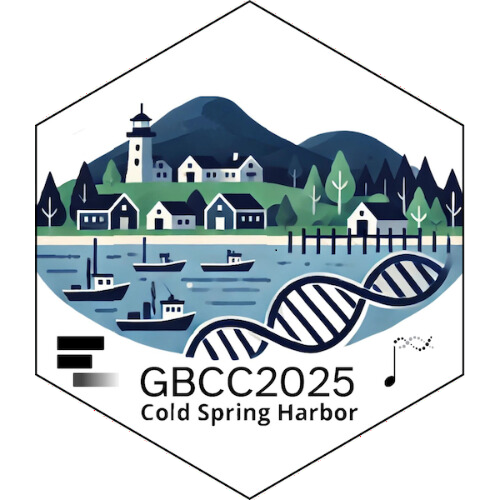Session 1 – 10:30 – 12:00 PM
Grace Auditorium | Moderator: Sehyun Oh
Introducing GalaxyMCP: Integrating AI Assistants with Galaxy Through the Model Context Protocol
Automated integration of R/Bioconductor tools into Galaxy
User-Defined, Safe, and Rapidly Deployable Galaxy Tools with Embedded Type-Safe Editing
Bringing Data to Life: Galaxy’s New Visualization Framework
Managing materials science workflows with Galaxy at STFC
Language-agnostic strategies for genomic data representation in Bioconductor
Streamlining the User Experience for Reproducible Image Analysis in Galaxy
Enabling Genomic Research at Scale with NHGRI AnVIL: A Cloud Platform for Genomic Data Analysis
Session 2A – 3:00 – 5:00 PM
Bush Hall | Moderator: Jenny Drnevich
From Upload to Execution: A Unified Galaxy Workflow Run Interface
More Usable and More Powerful Galaxy Dataset Collections
AI-augmented data analyses in Galaxy
Benchmarking Quantum Machine Learning Models in Galaxy
Leveraging Deep Learning with torch in R for Next-Generation Epigenetic Clock Development
The Galaxy-ML2 tool suite: Using Galaxy to promote best practices in machine learning for biomedical data science
NOVA: Leveraging Galaxy for Neutrons Scattering Data Analysis and Visualization
Towards the automatic integration of tools in Galaxy: the anvi’o suite and a new AI-driven automation pipeline
Dynamic meta-scheduling in Galaxy with TPV Broker for smarter workload distribution
One Million Heart Cells: Integrating Public Data on Galaxy to Explore How Cardiomyocytes Change in Atrial Fibrillation
gINTomics, a powerful Bioconductor package for multiomics data integration and visualization.
Bioconductor-R-Shiny Applications on Galaxy
Session 2B – 3:00 – 5:00 PM
Grace Auditorium | Moderator: Vincent Carey
Robust ancestry inference from challenging human molecular data with RAIDS
Meta-iPep: A metaimmunopeptidomics pipeline implemented within Galaxy platform to characterize HLA-bound microbial peptides for immunotherapy
Analyzing allele-specific methylation using Oxford Nanopore long-read DNA sequencing
Public gene expression cancer signatures across bulk, single-cell and spatial transcriptomics data with signifinder Bioconductor package
Host cell signaling during viral infection network perturbation analysis
SEMplR: An R package for predicting the effects of genetic variation on transcription factor binding
Enhancing rare variant analysis in biobanks: whole-genome annotation using GDS files
Orthology Detection at the Scale of Modern Genomics
Multiscale analysis of lung adenocarcinoma spatial transcriptomics data
Deciphering CLEC12A Negative Regulation of Neutrophil Activation by Network and Functional Enrichment Analyses
Broadening Metagenomic Horizons in Galaxy: Introducing the HiFi-MAG Pipeline, New Profilers, and Insights from BioDIGS
Visualizing and analyzing differential transcript usage
Session 3 – 1:00 – 2:00 PM
Grace Auditorium | Moderator: Lamda Moses
The Intergalactic Workflow Commission: Standardizing, Testing, and Distributing Reproducible Galaxy Workflows
A standardized R/Bioconductor framework for integrative analysis of histopathological images with multi-omics data
Advancing digital pathology with Galaxy: Tools for histological imaging foundation models
Computational considerations for analysis of Visium HD: A Bioconductor user’s perspective
sosta: a framework to analyze anatomical structures from spatial omics data
Universally accessible interactive curation workflows for large genome assembly
Session 4 – 4:00 – 5:00 PM
Grace Auditorium | Moderator: Mike Love
Empowering Bioinformatics in Africa through Bioconductor: Expanding Training and Community Engagement
Building UseGalaxy Capability in Canada
Mass Spectrometry-Centered Multi-Omics: Advancing Galaxy Training Materials for Integrated Analysis and Community Adoption
Training and education in the cloud with the NHGRI AnVIL
Molecular ecology at the sertão - Using Galaxy to empower research in developing communities
Democratising the Analysis of the Human Cell Atlas with Bioconductor
Session 5 – 10:30 – 12:00 PM
Grace Auditorium | Moderator: Scott Cain
